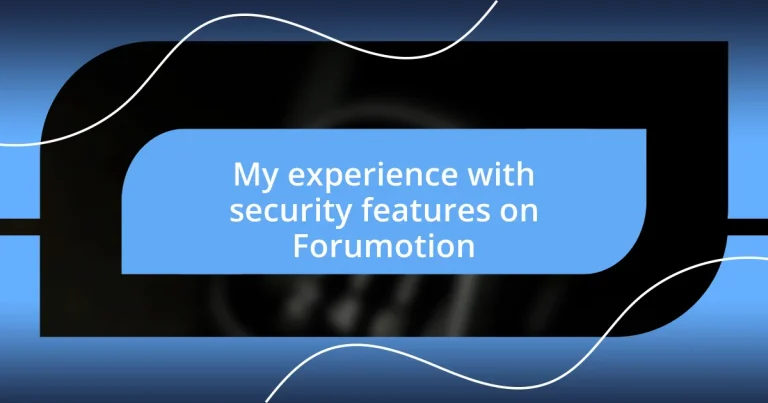Key takeaways:
- Forumotion offers robust security features like HTTPS encryption, user permissions, and CAPTCHA verification to protect user data and enhance forum safety.
- Implementing moderation tools and tailored permission settings empowers forum admins to manage user interactions and maintain quality discussions effectively.
- Encouraging strong password practices, two-factor authentication, and transparency in data collection fosters trust and enhances user privacy on forums.
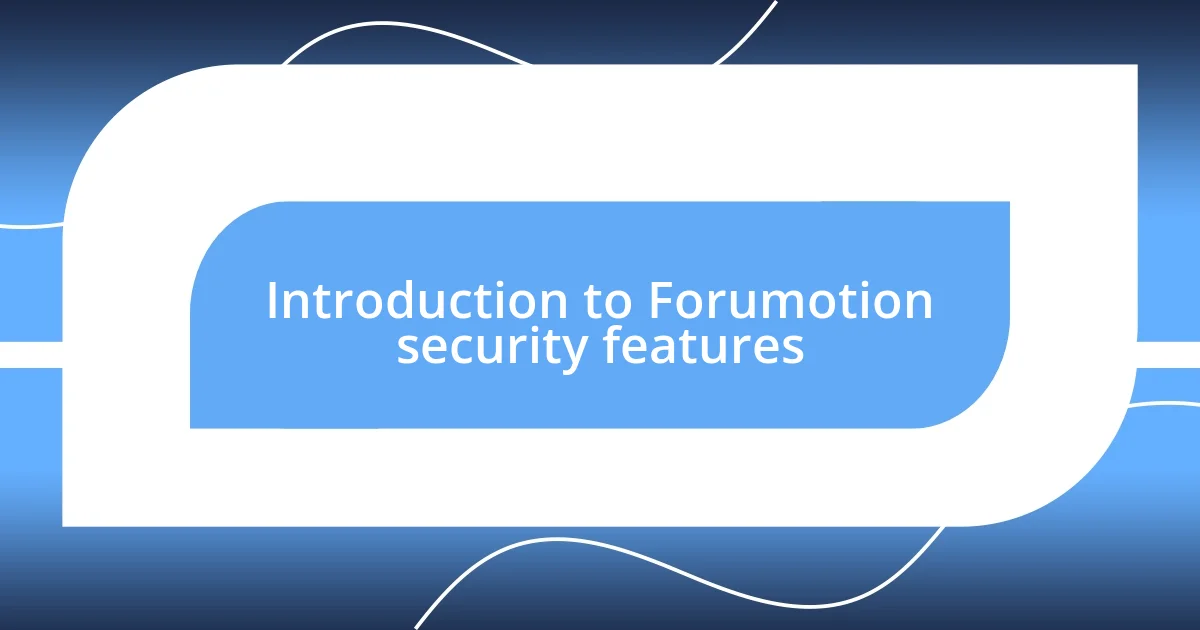
Introduction to Forumotion security features
When I first ventured into the world of Forumotion, security features were a top priority for me. I remember the feeling of unease I had, wondering how safe my data and that of my members would be. The platform offers a variety of security measures, including user permissions and CAPTCHA verification, which immediately put my mind at ease.
One standout feature is the ability to enable HTTPS, which encrypts data between users and the forum. It’s pretty reassuring, knowing that when I log in, my information is protected from prying eyes. Have you ever wondered how much safer your online interactions could be if data encryption was standard practice everywhere? It’s a powerful reminder of how important security measures can be in building trust within an online community.
Additionally, I’ve found that the ability to ban problematic users or IP addresses is essential. There were moments when I faced unwanted spam and trolling, and the swift action I could take made all the difference. It’s not just about having features; it’s about feeling empowered to create a safe space. Do you feel secured in your online forums? I truly believe that a proactive approach to forum security fosters a sense of belonging and safety among members.
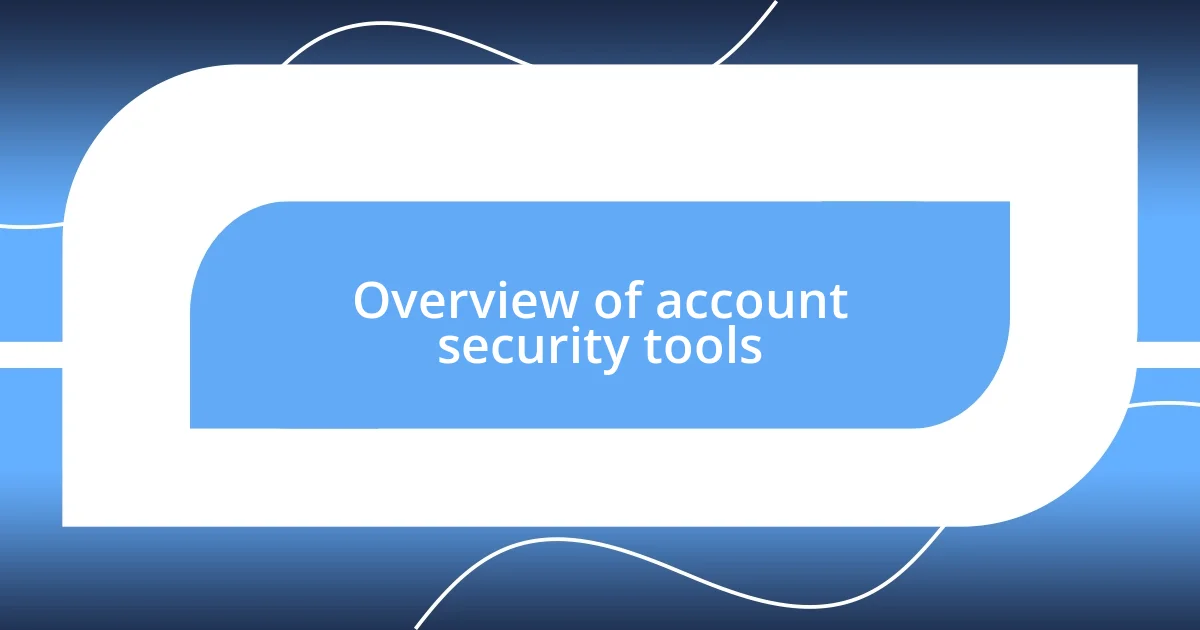
Overview of account security tools
The security tools available on Forumotion were a game changer for me. Each feature serves a specific purpose, ensuring that both my account and forum members feel secure. I appreciate how user permissions allow me to control who can see and interact with certain content; it’s like having a virtual gatekeeper that protects valuable discussions from unwarranted access.
To give you a clearer picture, here are some key security features I found particularly useful:
- User Permissions: Grant different levels of access to various users, ensuring sensitive content is only visible to authorized members.
- CAPTCHA Verification: This feature prevents bots from creating accounts or spamming discussions, which I’ve found essential in keeping my forum organized.
- HTTPS Encryption: Adds a layer of protection during data transfer, so I can be confident that members’ information is secure.
- IP Address Banning: Quickly ban disruptive users or known spammers, which has saved me from many frustrating moments.
- Two-factor Authentication: An additional security measure that ensures only I can access my account, adding peace of mind.
Embracing these tools profoundly impacted my experience; it felt like building a digital fortress for my community. It’s empowering to know that my efforts to maintain a safe space are backed by robust security features.
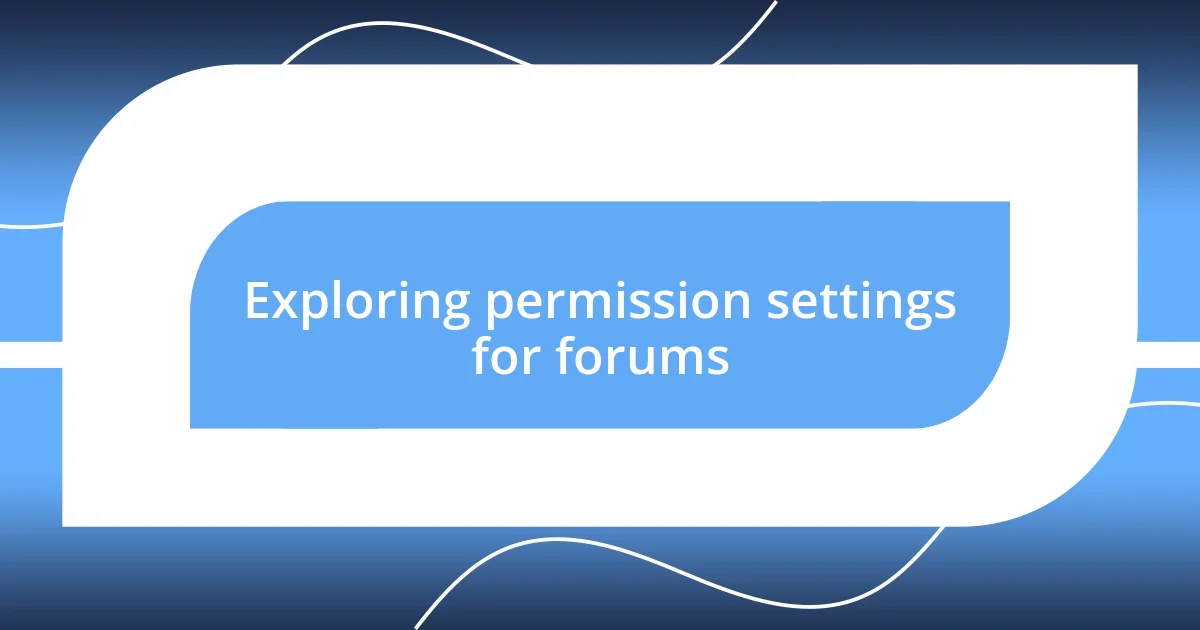
Exploring permission settings for forums
When I dove into the permission settings on Forumotion, I quickly realized how essential they were for managing my community. I discovered that I could tailor access for different user roles, determining who could post, view, or moderate content. This control made such a difference; I remember the sense of relief I felt when I could restrict sensitive discussions to just a few trusted members. It’s like having the ability to choose who gets a backstage pass to your forum.
While navigating these settings, I experienced a few hiccups, like accidentally granting too much access to a user. Thankfully, the easy-to-use interface allowed me to retract those permissions swiftly. I think it speaks volumes about how adaptable Forumotion is for different forum scenarios. Have you ever experienced a moment where you had to quickly change access settings? It’s exhilarating to see the immediate impact on your community’s dynamics!
With these permission settings, I created various user groups that defined the privileges of each member. It was fascinating to observe how different groups interacted. Seeing the top contributors empowered with exclusive access sparked more meaningful discussions, which made me proud. Sometimes, just the right permission setting can encourage the most valuable interactions in your online space.
| Setting | Description |
|---|---|
| User Permissions | Control access levels for users to specific sections of the forum. |
| Moderation Rights | Assign moderator roles to suitable users who can manage discussions. |
| Post Restrictions | Limit who can post in certain threads, ensuring quality content. |
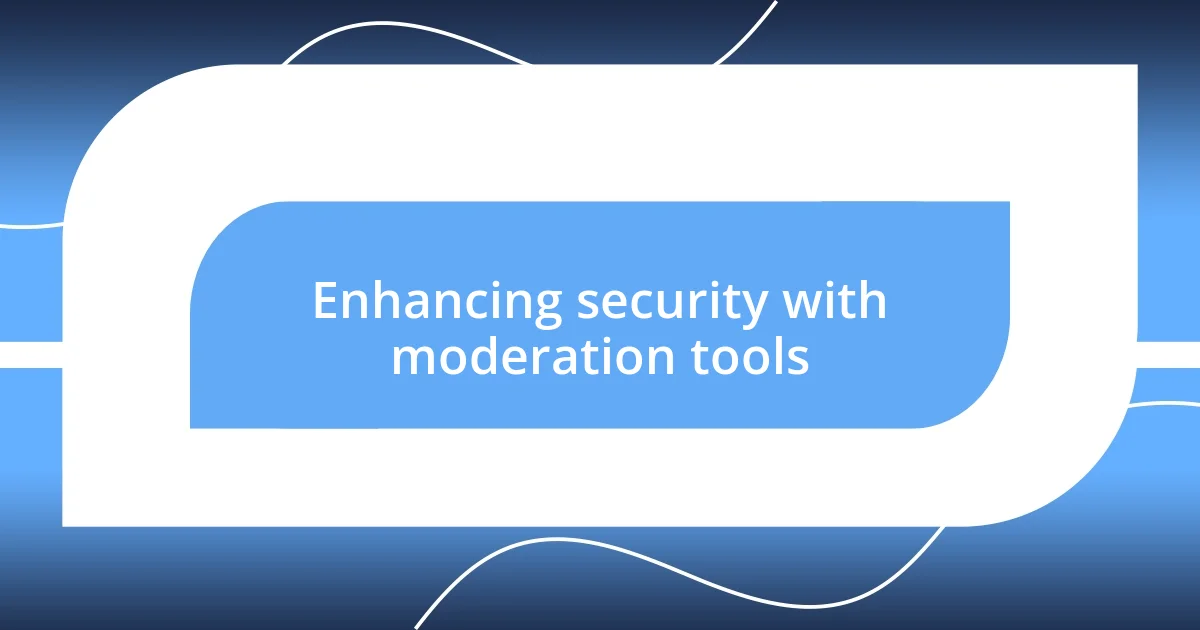
Enhancing security with moderation tools
One of the most effective ways I enhanced security on my Forumotion forum was through moderation tools. When I initially implemented moderation rights, it felt like I was inviting a trustworthy friend into my space. These moderators could flag inappropriate content or warn users, making my role manageable. I remember a time when a heated discussion escalated, and having dedicated moderators on hand helped deescalate the situation swiftly. Isn’t it comforting to know that you don’t have to handle everything alone?
Another feature I found particularly beneficial was post restrictions. I vividly recall a period when I allowed open posting for all users, only to be bombarded with spam. That was a real wake-up call for me. By limiting who could post in specific threads, I not only maintained the quality of the discussions but also encouraged members to think more before contributing. It created a sense of pride among users; they valued being part of a community where their thoughts were taken seriously.
Moreover, the ability to define specific user roles allowed me to delegate tasks effectively. There’s something empowering about seeing members rise to the occasion and take ownership of their roles. I still feel a rush of excitement when I watch new moderators confidently step in to manage discussions. Have you ever experienced that delightful mix of anxiety and pride when someone you trusted exceeds your expectations? It’s fantastic to create a community that thrives on collaboration and respect, all while ensuring the integrity of your forum remains intact.
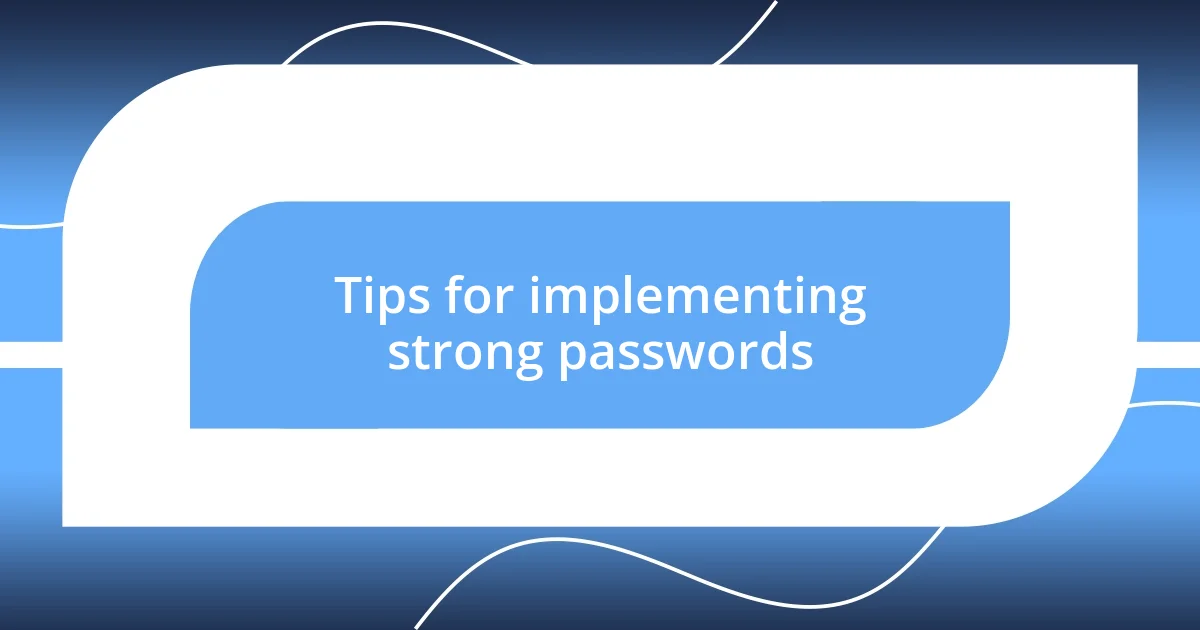
Tips for implementing strong passwords
When it comes to implementing strong passwords, I’ve found a few strategies to be particularly effective. First, I always encourage using a combination of uppercase and lowercase letters, numbers, and special characters. One time, in my rush to set up a new account, I opted for an easy-to-remember password and regretted it later when I noticed unusual login attempts. That experience taught me that a little complexity in my password could save me from a headache down the line.
Another tip that has worked wonders for me is using a password manager. I’ll be honest; I used to rely on memory alone, but I constantly ended up using the same password across different sites, which is just asking for trouble! By storing unique passwords in a manager, I not only have secure options but also the peace of mind that comes with knowing my accounts are protected. Have you ever juggled multiple passwords and thought it was too much to handle? A password manager is like having a digital lockbox—it keeps everything safe and accessible without the stress.
Lastly, I can’t stress enough the importance of changing passwords regularly, especially after any security scare. Not long ago, I received an alarming email about a data breach involving a service I used. Immediately, I changed my passwords for that and any linked accounts. It felt empowering to take action! Have you ever experienced that sudden rush of urgency when you realize it’s time to update your security? It’s an essential habit that not only boosts security but also gives you that confident feeling of taking control of your online safety.
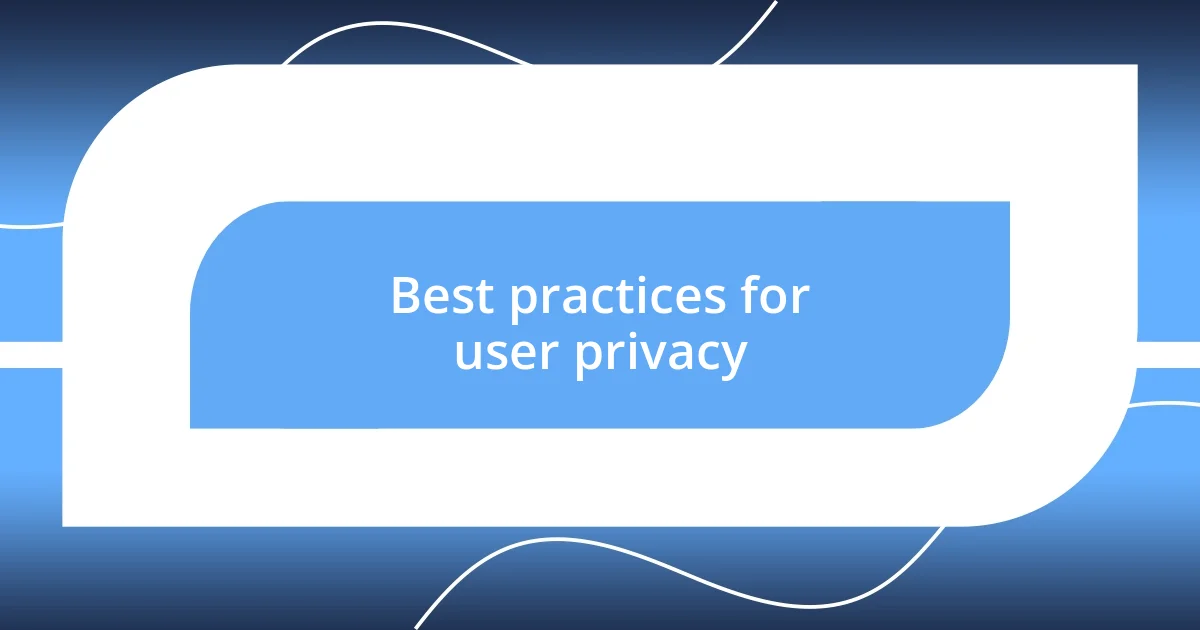
Best practices for user privacy
One of the best practices for user privacy that I’ve embraced is encouraging two-factor authentication (2FA). I remember my initial skepticism about adding that extra step. However, when a friend’s account was compromised due to a weak password, it hit home for me. Implementing 2FA not only adds a layer of protection but gives users peace of mind knowing their accounts have an extra shield against unauthorized access. Have you ever felt that sigh of relief after taking a proactive security measure?
Another aspect I focus on is educating users about the importance of privacy settings. Once, I conducted a small workshop on navigating these settings, and I can’t quantify the ‘aha moments’ I witnessed. Many users were unaware that they could adjust who sees their online activity. It’s enlightening to help them realize they have control over their personal information. After the session, several members shared stories about how they’d previously felt exposed online, reinforcing how crucial it is for platforms to empower their users with knowledge.
Finally, I can’t emphasize enough the significance of transparency regarding data collection. When I introduced a clear privacy policy on my forum, I noticed an immediate boost in trust among my members. They appreciated knowing what data was collected and how it would be used. Transparency fosters a community where members feel valued and respected. Have you ever participated in a space where you felt informed and secure? That atmosphere can significantly enhance user engagement and satisfaction.












